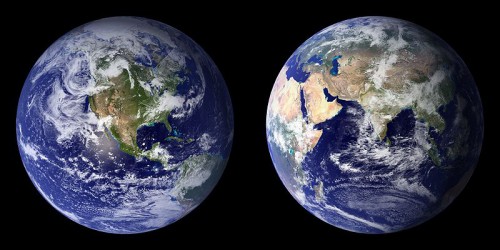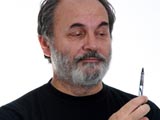Earth Civilization Project (ECP)
by Tarık Günersel / April 26, 2013 / No comments
Wouldn’t it be good to create an umbrella project to build a better world?

Earth, the Blue Marble, as seen from space. Photo: NASA via Wikimedia commons.
Buildings wouldn’t enjoy earthquakes if they were conscious. Maybe that’s the reason people refrain from questioning their thinking and living habits until they face some extraordinary situation that forces them to find a better survival strategy.
But before things get too dire, let’s shake things up just a bit, shall we?

- Life is words in action, literature is action in words.
Humans are about to destroy their spaceship Earth. Some of them are aware of this and they try to change the course of events. Will they succeed? Will more humans be alarmed and do something?
Literature is vital and translators are messengers of world peace.
Though I shall focus on the literary scene in Turkey and its problems regarding freedom of expression, I shall not omit the other parts of our planet. Today local is global and vice versa. 
- Tarık Günersel is a poet, playwright, aphorist, librettist and short story writer. He is the president of PEN Turkey and an ex-member of the PEN International Board. He studied English Literature at Istanbul University. A self-exile after the military coup in 1980, he spent four years in Saudi Arabia with his wife Füsun and their daughter Barış, teaching English. A dramaturg at Istanbul City Theater since 1991, he has acted on stage and screen and directed some of his plays. He proposed World Poetry Day in 1997 which was accepted by PEN International and declared by UNESCO as the 21st of March. His translations into Turkish include works by Samuel Beckett, Vaclav Havel and Arthur Miller. His works include The Nightmare of a Labyrinth (mosaic of poems and stories), and How’s your slavery goin’? His Oluşmak (To Become), a “life guide for myself,” includes ideas from world wisdom of the past four millennia.
With one planet and many world views, do we look for a common denominator? Yes, we often do. But is it possible? It’s worth trying. Can we still propose a common denominator even if it’s hard to find, or perhaps doesn’t exist? Certainly The Declaration of Human Rights is a step in that direction.
My life-guide-in-progress, Oluşmak – To Become, is also a step in that direction. That book is an attempt to distill several millennia of the world’s wisdom and embrace its plurality within a naturalist frame.
But let it be said: Defense alone is not enough to guard against global destruction. A proactive position is necessary, not only for survival, but also for a better life.
On that note it’s good to discuss the future (or, rather, the possible futures) with information, concerns, and suggestions—as Al Gore does in his new book, The Future. However, his concept of “sustainable capitalism” is less appealing to me than the ideal of transcending capitalism altogether. Granted, the discussion would be missing something if we didn’t have a comprehensive goal with a name to start with.
“Civilization” Revisited
Still, there hardly exists any term or concept that has been without criticism. The word “civilization” itself is not exempt. Personally, I prefer the term “post-civilization,” but that term could also be used to signify whatever remains after a nuclear catastrophe, so I’ll just use the word “civilization” without over-idealizing it, and ask: Is a world civilization possible?
A similar question has also been posed on the Internet: “Is an ecological civilization possible?”
When discussing these issues, my friends mentioned the seminar they had attended in Baltimore, entitled “Common Good.” Though the intent of this phrasing is good, given some serious structural conflicts of people’s interests in real life, I doubt that it would be sufficient as a guiding principle. On the other hand, they think the term “world civilization” might imply an oppressive world government. Besides, that term is used, both in singular and plural forms, to designate “past” civilizations.
An Umbrella Project
How about saying “earth” instead of “world”? The name of our planet implies astronomy, our universe, and the limitations of our spaceship. What about “Solar Civilization Project”? An Internet search says yes in the form of a book by Mikhael Aivanhov Omraam, Toward a Solar Civilization. But now I wonder, who or what could limit our passion? Why not a Universe Civilization Project, or even a Multiverse (Multiversal) Civilization Project? Or, Multiversal Post-Civilization Project (MPCP)?
So, for the sake of simplicity, when I say ECP (Earth Civilization Project) I’ll be referring to all the related concepts above.
EC is possible. We can detect its roots in past and present individuals, movements, local and international organizations, projects, works, festivals, and other interactions.
Because it’s a combination of utopianism and realism, ECP requires the free exchange of information and ideas. That is why Sampsonia Way is one of the roots of Earth Civilization. So are you. Otherwise, you wouldn’t have read this.
However, there is much more to discuss on this topic. As a result, this essay is probably just the opening chapter of a new book, entitled Earth Civilization Project.
Bon voyage.




